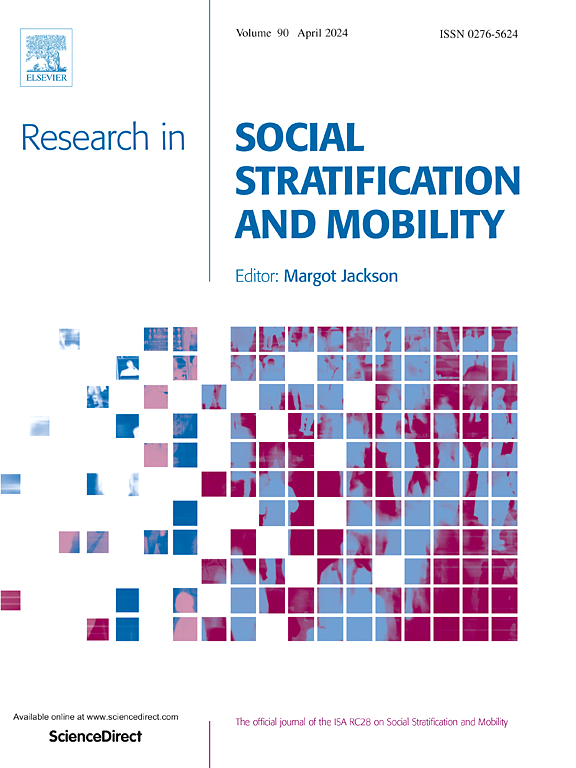Stratified strategies? Gender, social background and access to selective fields in Norway
IF 2.7
1区 社会学
Q1 SOCIOLOGY
引用次数: 0
Abstract
Fields of study are segregated along the lines of social class and gender. The most prestigious and selective professional fields, such as medicine or law, are persistently dominated by socially privileged students but have undergone a pronounced feminization in recent decades. We first investigate gender and SES differences in strategies, in admission chances and whether strategies mediate these differences. Second, we explore how gender and SES interact in shaping applicants’ strategies and.their admission chances. Third, we consider the role of students’ GPA and how different social groups use compensatory strategies to enhance their chances of admission. The Norwegian context is well suited to study this topic because of its comprehensive education system and its field-specific selectivity in higher education,which is mainly based on candidates’ grade point average (GPA), but also offers opportunities to invest in certain strategies to gain access to the most prestigious fields of study. Using full population register data and discrete survival models, we find that high-SES candidates and women have a greater chance of getting admitted, which is mainly explained by their higher GPA. High-SES and male applicants are somewhat more likely to use strategies to meet admission criteria that the Norwegian admission system offers, especially if they have low GPAs, indicating a system of compensatory advantage. However, these overall small differences in strategies seem to perpetuate already existing inequalities rather than increasing or alleviating them.
分层策略?挪威的性别、社会背景和进入选择性领域的机会
研究领域是按照社会阶级和性别划分的。最具声望和选择性的专业领域,如医学或法律,一直由社会特权学生主导,但近几十年来,女性化趋势明显。我们首先调查了性别和社会经济地位在策略、录取机会方面的差异,以及策略是否介导了这些差异。其次,我们探讨了性别和社会经济地位如何相互作用,形成申请人的策略和。他们的录取机会。第三,我们考虑了学生GPA的作用,以及不同的社会群体如何使用补偿策略来提高他们的录取机会。挪威的环境非常适合研究这个主题,因为它的综合教育体系和高等教育的特定领域选择性,主要基于候选人的平均成绩(GPA),但也提供了投资某些策略的机会,以获得最负盛名的研究领域。利用全人口登记数据和离散生存模型,我们发现高社会经济地位的候选人和女性被录取的机会更大,这主要是由于他们的GPA更高。高社会经济地位和男性申请人更有可能使用策略来满足挪威录取系统提供的录取标准,特别是如果他们的平均成绩较低,这表明有补偿性优势。然而,战略上的这些总体上的微小差异似乎使已经存在的不平等永久化,而不是增加或减轻不平等。
本文章由计算机程序翻译,如有差异,请以英文原文为准。
求助全文
约1分钟内获得全文
求助全文
来源期刊
CiteScore
7.80
自引率
6.00%
发文量
46
期刊介绍:
The study of social inequality is and has been one of the central preoccupations of social scientists. Research in Social Stratification and Mobility is dedicated to publishing the highest, most innovative research on issues of social inequality from a broad diversity of theoretical and methodological perspectives. The journal is also dedicated to cutting edge summaries of prior research and fruitful exchanges that will stimulate future research on issues of social inequality. The study of social inequality is and has been one of the central preoccupations of social scientists.

 求助内容:
求助内容: 应助结果提醒方式:
应助结果提醒方式:


